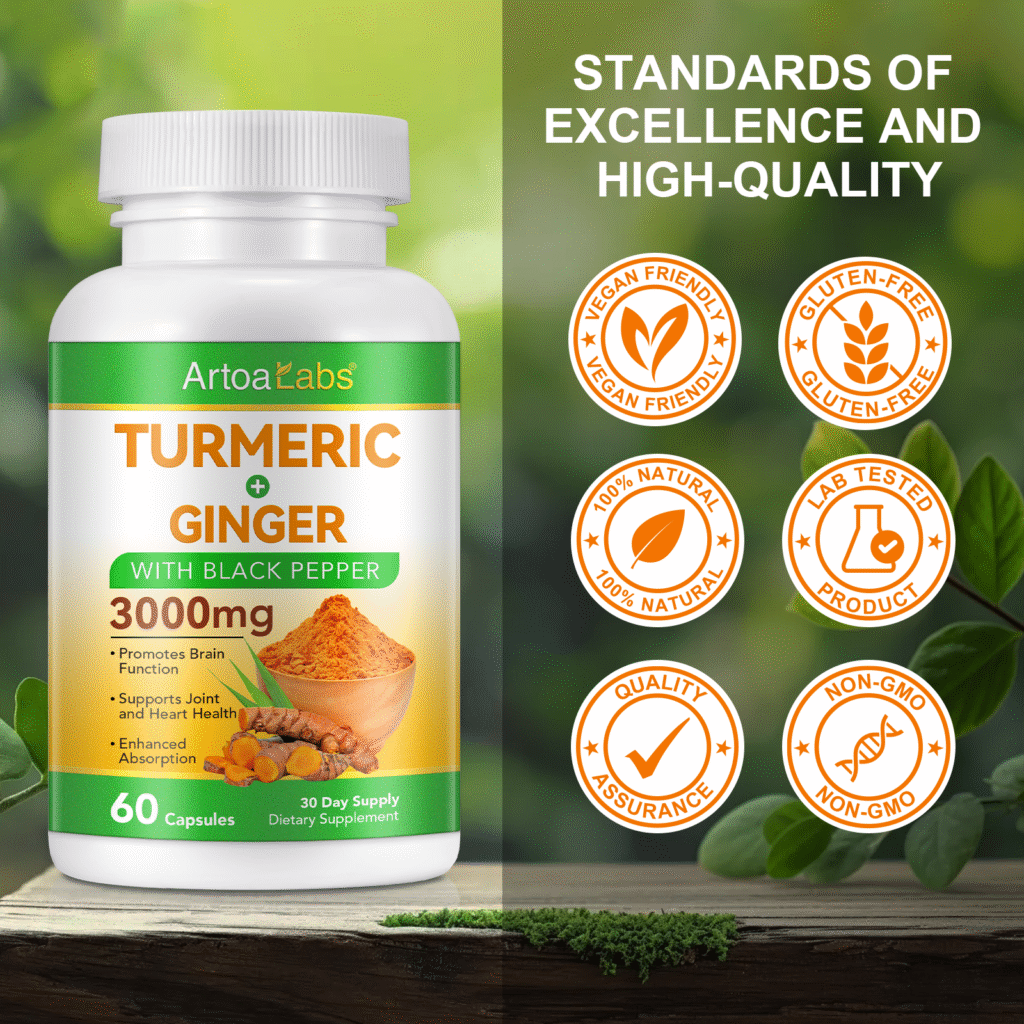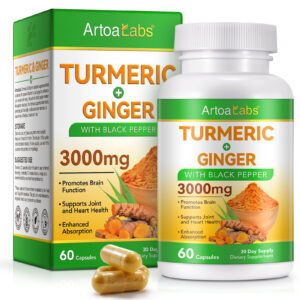Turmeric Curcumin Benefits for Health & Wellness
Turmeric Curcumin has been used in Asian cooking and medicine for thousands of years. Known as the “Golden Spice”, turmeric is more than just a flavorful ingredient; it’s a healing powerhouse. The active compound curcumin has drawn worldwide attention for its potential to fight inflammation, boost immunity, and improve overall wellness.
Today, Turmeric Curcumin supplements are among the most trusted natural remedies, used by millions to support joint health, brain function, and cardiovascular health. In this detailed guide, we’ll explore everything you need to know about Turmeric Curcumin, including its benefits, dosage, side effects, and the science behind it.
What is Turmeric Curcumin?
Turmeric (Curcuma longa) is a bright yellow root from the ginger family, widely used in curry dishes and herbal medicine. The main active ingredient in turmeric is curcumin, which is responsible for its healing properties.
However, turmeric naturally contains only 3–5% curcumin. This means eating turmeric powder alone won’t give you the same benefits as concentrated supplements. That’s why most Turmeric Curcumin supplements include BioPerine (black pepper extract) or healthy fats to increase absorption by up to 2000%.
Nutritional Profile of Turmeric
-
Curcuminoids: bioactive compounds with strong anti-inflammatory and antioxidant effects.
-
Essential oils: such as turmerone, atlantone, and zingiberene.
-
Vitamins & minerals: including Vitamin C, Vitamin B6, iron, manganese, and potassium.
These nutrients work together to support health at multiple levels.
Proven Health Benefits of Turmeric Curcumin
1. Natural Anti-Inflammatory
Inflammation is necessary to fight infections and heal injuries, but chronic inflammation is harmful. Studies show that curcumin can block molecules like NF-kB, which play a major role in chronic diseases.
In fact, curcumin has been shown to match the effectiveness of some anti-inflammatory drugs, without the side effects.
2. Joint Health and Arthritis Relief
One of the most common uses of Turmeric Curcumin is for arthritis and joint pain. Clinical studies reveal that patients with osteoarthritis and rheumatoid arthritis experience less stiffness and swelling when taking curcumin supplements.
Regular use supports flexibility, mobility, and comfort in daily movement.
3. Powerful Antioxidant Support
Free radicals damage cells and speed up aging. Curcumin neutralizes free radicals while also boosting the body’s own antioxidant enzymes. This double action makes it one of the strongest natural antioxidants.
4. Immune System Booster
By reducing oxidative stress and fighting harmful pathogens, curcumin strengthens the body’s defense system. It may also help shorten the duration of colds and flu.
5. Brain Health and Mental Clarity
Curcumin may increase Brain-Derived Neurotrophic Factor (BDNF), a growth hormone that helps neurons form new connections. Low BDNF levels are linked to depression, Alzheimer’s, and other brain disorders.
Some studies suggest curcumin can improve memory and concentration and may support long-term brain health.
6. Heart and Cardiovascular Support
Curcumin improves the function of the endothelium (the lining of blood vessels). Poor endothelial function is a major cause of heart disease.
It also helps reduce bad cholesterol, supports healthy blood circulation, and lowers the risk of clot formation.
7. Digestive and Liver Health
Turmeric stimulates bile production, which helps break down fat and improve digestion. It also protects the liver by flushing out toxins and reducing oxidative stress.
8. May Reduce Risk of Chronic Diseases
Research shows curcumin may play a role in preventing conditions like:
-
Type 2 diabetes
-
Alzheimer’s disease
-
Certain cancers (by slowing tumor growth in lab studies)
While more human studies are needed, the results so far are promising.
Best Ways to Take Turmeric Curcumin
There are several ways to include Turmeric Curcumin in your daily routine:
-
Capsules or Tablets: The most effective form, often with BioPerine for absorption.
-
Powder: Can be added to smoothies, teas, or recipes.
-
Liquid extracts: Offer fast absorption.
-
Turmeric Tea (Golden Milk): A soothing blend of turmeric, milk, and spices.
Tip: Always take Turmeric Curcumin with food, preferably with healthy fats (olive oil, avocado, coconut oil) to boost absorption.
Recommended Dosage
-
General health: 500–1000 mg of standardized curcumin extract daily.
-
Joint pain/arthritis: Up to 1500 mg daily (split into 2–3 doses).
Always consult your healthcare provider before starting supplements, especially if you take other medications.
Possible Side Effects of Turmeric Curcumin
Turmeric Curcumin is generally safe, but very high doses may cause:
Stomach upset, Nausea, Dizziness, and Diarrhea
Who should be cautious?
People taking blood thinners, Pregnant or breastfeeding women, and Individuals with gallbladder problems
Turmeric Curcumin vs. Turmeric Powder
- Turmeric Curcumin Supplements: Curcumin content (95% standardized extract), Absorption (High with BioPerine), Convenience (Easy-to-take daily capsules), and Health impact (Strong therapeutic effects).
- Turmeric Powder: Curcumin content (3–5%), Absorption (Low), Convenience (Cooking uses only), and Health impact (Mild)
Turmeric Curcumin is more than just a spice; it is a scientifically supported supplement with powerful health benefits. It can help reduce inflammation and promote brain and heart health, offering a natural way to support your body’s overall well-being. By selecting high-quality supplements that include BioPerine for enhanced absorption and using them regularly, you may experience noticeable improvements in energy, mobility, and overall well-being. If you’re looking for a natural, safe, and effective supplement, Turmeric Curcumin is an excellent option.

 Toenail Clippers For Thick Ingrown 1Pcs Opening Non-Slip
Toenail Clippers For Thick Ingrown 1Pcs Opening Non-Slip 
